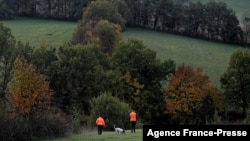A hunter is under investigation in France for shooting dead a brown bear in a case that has highlighted tensions over the reintroduction of these animals to the wild through European Union-funded programs.
As prosecutors investigated whether the man illegally shot the bear, a protected animal under European law, it has reignited the debate over the renewed presence of bears into the Pyrenees, the mountain range between France and Spain.
Christine Tequi, the president of the Ariège Pyrenees, a regional authority, said officials feared bear attacks on humans.
“Today, you can really see that cohabitation is complicated,” she told AFP news agency.
The 70-year-old man said he shot the animal after it attacked and injured him while he was out hunting wild boar last week.
He fired two shots at the female bear, who was out with her two cubs, killing her instantly.
The man was flown to hospital suffering from serious leg injuries after the incident in the Seix region of Ariège in the Pyrenees mountains in south-west France.
Hunting organizations held a demonstration in Ariege last weekend to show their support for the injured man.
Brown bears are seen as a threat to livestock by some farmers in France and across the border in Spain.
After relentless hunting reduced the bear population to only three by the 1990s, an EU program began to bring them back to the region using stocks from Slovenia.
A census carried out in 2020 found there were 64 bears across the Pyrenees while in Cantabria, in northern Spain, there are 350, according to figures from Spain's Brown Bear Foundation, FOP.
Animals vs. people
The shooting in France is the latest fatal encounter between man and bear.
In November last year, a hunter shot dead a female bear over the border in Aragon in the Spanish Pyrenees, raising to three the number killed in 2020. He was cleared of any wrongdoing after claiming he acted in self-defense.
The killing happened just 10 days after police in the neighboring region of Catalonia said they arrested 12 men in connection with the death of a bear in April.
Another bear, a six-year-old male, was found dead in the Val d'Aran area near the French border but the police later found it was poisoned with antifreeze.
Newspaper reports said the investigation found evidence the killers were members of a criminal gang.
Critics have argued that as the bear population grows, the animals are more difficult to control because they need more food which brings them into closer contact with humans.
The French government reported that between January and October of this year, bears were believed to be behind the deaths of 625 sheep, 16 cattle, 17 horses and a dog.
Brown bears are omnivores and only attack livestock when opportunity arises. They mostly feed on berries and other plants.
Some who live in the Pyrenees accuse EU officials of introducing bears to the region without taking into consideration how the plan would impact the local community.
“Bears were something imposed from Europe, paid with European funds but they never considered how it would affect the people who actually live here,” Marc Cuny, president of the Association of the Pyrenees Catalan Horse in the Aran Valley, told VOA.
“They cause a problem for farmers and do not contribute to tourism.”
Fernando Ballesteros, a biologist with FOP, conceded that despite efforts for man and bear to live together, tensions persist.
He said regional governments and the FOP have worked with farmers to recruit shepherds to look after sheep, provide night accommodation for the livestock and guard dogs.
“We have come a long way in Cantabria but in France and in the Spanish Pyrenees we have lost the culture of living together with bears which used to exist years ago,” he said in an interview with VOA.
“The reason there is resentment is because in many cases agriculture is dying. Younger generations are not working on farms, and it is a hard life.”
However, he says the bear is beginning to be seen as a boost for the rural economy.
A study by the University of Oviedo in northern Spain found tourism from brown bears brought income of €20 million (US $22,675,500) since re-introduction and 300 jobs.
Steve Cracknell is the author of The Implausible Rewilding of the Pyrenees, which deals with reintroducing bears and other 'top predators' like wolves to this mountain range.
“I don't approve of illegal killings of bears and don't condone it. However, I can appreciate the desperation of some shepherds who find their values challenged and who have no realistic chance in the long term of halting the EU-wide 'rewilding initiative',” he told VOA.
Some information in this report came from Agence France-Presse.
Editor’s note: An earlier version of this story incorrectly described Christine Tequi as a council official. She is an elected representative as the president of the Ariege Pyrenees, a regional authority. This version also corrects the quote in the last graph of the story.




